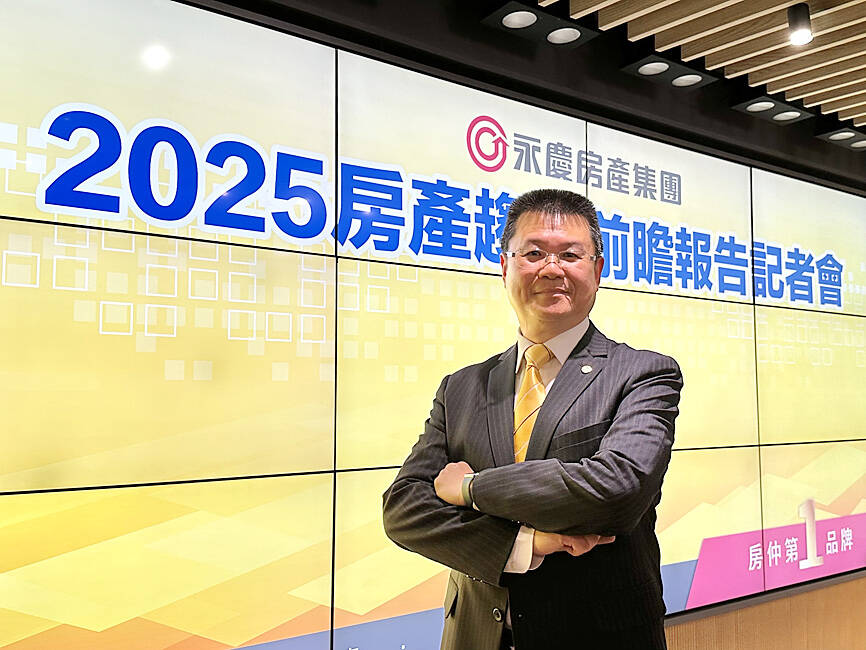Homebuyers expect housing prices to drop next quarter and sellers might need to cut prices by more than 10 percent to facilitate transactions, a quarterly survey released yesterday by Evertrust Rehouse Co (永慶房屋) showed.
Forty-three percent of prospective buyers anticipate housing price corrections in the second quarter, suggesting an increase of 10 percentage points from three months earlier, while people with price hike expectations fell from 32 percent to 26 percent, Evertrust research manager Daniel Chen (陳賜傑) said, citing a survey of 1,239 people between Feb. 21 and March 5.
Chen attributed the sentiment retreat to lingering loan restrictions on the part of domestic lenders and expansive credit controls that the central bank introduced in September last year to cool the market.

Photo: Hsu Yi-ping, Taipei Times
Fifty-seven percent responded that the tightening measures dampened their purchasing interest, with 9 percent ditching purchasing plans altogether, he said.
Housing transactions might total 136,000 to 146,000 units in the first half of this year, shrinking 17 to 23 percent from the same period last year, Evertrust general manager Yeh Ling-chi (葉凌棋) said, adding that deals fell 25 percent in the first two months of this year from the same period last year.
Houses priced below NT$20 million (US$604,504) became mainstream across Taiwan as investors fled the market, leaving first-home buyers and people with real demand to underpin transactions, Yeh said.
A 5 percent to 10 percent price drop would prompt 20 percent of prospective buyers to join the market and a 10 to 15 percent concession would motivate 29 percent of prospective buyers, he said.
“The findings render wild cuts of up to 30 percent on the part of buyers unlikely to close deals,” he said. “A tug of war over house values between sellers and buyers has slowed the market.”
As a result, the number of houses available for sale has spiked by double-digit percentage points across Taiwan for the past six months, he said.

In Italy’s storied gold-making hubs, jewelers are reworking their designs to trim gold content as they race to blunt the effect of record prices and appeal to shoppers watching their budgets. Gold prices hit a record high on Thursday, surging near US$5,600 an ounce, more than double a year ago as geopolitical concerns and jitters over trade pushed investors toward the safe-haven asset. The rally is putting undue pressure on small artisans as they face mounting demands from customers, including international brands, to produce cheaper items, from signature pieces to wedding rings, according to interviews with four independent jewelers in Italy’s main

Japanese Prime Minister Sanae Takaichi has talked up the benefits of a weaker yen in a campaign speech, adopting a tone at odds with her finance ministry, which has refused to rule out any options to counter excessive foreign exchange volatility. Takaichi later softened her stance, saying she did not have a preference for the yen’s direction. “People say the weak yen is bad right now, but for export industries, it’s a major opportunity,” Takaichi said on Saturday at a rally for Liberal Democratic Party candidate Daishiro Yamagiwa in Kanagawa Prefecture ahead of a snap election on Sunday. “Whether it’s selling food or

CONCERNS: Tech companies investing in AI businesses that purchase their products have raised questions among investors that they are artificially propping up demand Nvidia Corp chief executive officer Jensen Huang (黃仁勳) on Saturday said that the company would be participating in OpenAI’s latest funding round, describing it as potentially “the largest investment we’ve ever made.” “We will invest a great deal of money,” Huang told reporters while visiting Taipei. “I believe in OpenAI. The work that they do is incredible. They’re one of the most consequential companies of our time.” Huang did not say exactly how much Nvidia might contribute, but described the investment as “huge.” “Let Sam announce how much he’s going to raise — it’s for him to decide,” Huang said, referring to OpenAI

The global server market is expected to grow 12.8 percent annually this year, with artificial intelligence (AI) servers projected to account for 16.5 percent, driven by continued investment in AI infrastructure by major cloud service providers (CSPs), market researcher TrendForce Corp (集邦科技) said yesterday. Global AI server shipments this year are expected to increase 28 percent year-on-year to more than 2.7 million units, driven by sustained demand from CSPs and government sovereign cloud projects, TrendForce analyst Frank Kung (龔明德) told the Taipei Times. Demand for GPU-based AI servers, including Nvidia Corp’s GB and Vera Rubin rack systems, is expected to remain high,